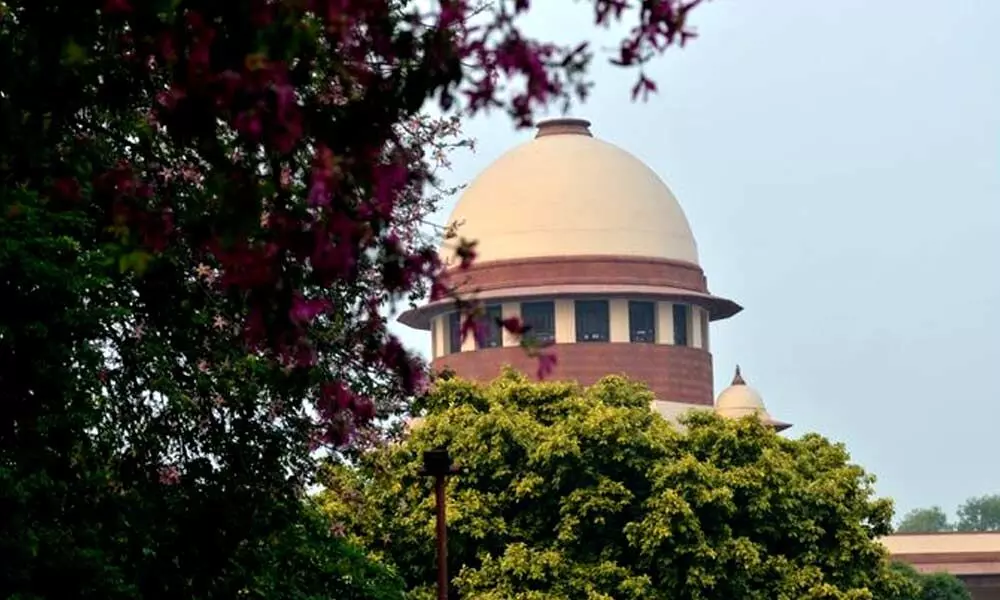Live
- Swarna Andhra@2047
- CM Revanth pitches for Railway Coach Factory at Kazipet
- ICU Ward opened at district hospital
- Pushpa Actor’S Action-Packed Day: Lights, camera, arrest
- National Lok Adalat today
- Teacher Manga Rani selected for national workshop
- MyVoice: Views of our readers 14th December 2024
- Soros & Gandhis links raise many disturbing questions
- Record additions in non-fossil fuel energy in India
- Indian teens’ grand arrival on world stage
Just In
'Can't be superficial or illusory': Supreme Court declares Tamil Nadu's Vanniyar quota law unconstitutional


Supreme Court (File/Photo)
The Supreme Court on Thursday said caste can be the starting point for identifying backward classes, but cannot be the sole basis as it declared a Tamil Nadu 2021 law on internal reservation of 10.5 per cent in jobs and education to the 'Vanniyar' community ultra vires of the fundamental rights to equality and non-discrimination on the basis of caste.
New Delhi: The Supreme Court on Thursday said caste can be the starting point for identifying backward classes, but cannot be the sole basis as it declared a Tamil Nadu 2021 law on internal reservation of 10.5 per cent in jobs and education to the 'Vanniyar' community ultra vires of the fundamental rights to equality and non-discrimination on the basis of caste.
On the aspect of reservation to Vanniyar community under the most backward classes category, a bench of Justices L. Nageswara Rao and B. R. Gavai said: "We hold that the classification sought to be made under the 2021 Act is unreasonable and, therefore, the 2021 Act is violative of Articles 14, 15 and 16, as there is no substantial basis for differentiating the Vanniakula Kshatriyas and granting them separate reservation."
The Tamil Nadu special reservation of seats in educational institutions including private educational institutions and of appointments or posts in the services under the state within the reservation for the Most Backward Classes and Denotified Communities Act, 2021 was declared as unconstitutional by the Madras High Court.
Justice Rao, who authored the judgment on behalf of the bench, said the state government has the competence to classify the Vanniakula Kshatriyas or any other community or group of communities within backward classes as a particular class for the grant of special measures.
"There should be a reasonable basis for categorising such communities into a different section from the rest of the communities within the MBCs (Most Backward Classes' and DNCs (Denotified Communities), on grounds which cannot be superficial or illusory," he said in the 87-page judgment.
The bench noted that choosing a particular caste and providing a special reservation of 10.5 per cent out of the 20 per cent to such caste is discriminatory, in the absence of any sound differentiation from communities who are similarly situated and were, therefore, grouped together for the purposes of receiving the benefits of 20 per cent reservation.
The bench said population being cited as the sole factor to support this classification is in the teeth of the judgments of this court in Indra Sawhney (nine-judge, 1992) and Jarnail Singh.
The bench said: "There is no infringement of the equal protection rule, if the law deals alike with all of a certain class, the legislature has the undoubted right of classifying persons and placing those whose conditions are substantially similar under the same rule of law, while applying different rules to persons differently situated."
It, however, added: "The classification should never be arbitrary, artificial or evasive. It must rest always upon real and substantial distinction."
The bench said there is no substantial basis for classifying the 'Vanniakula Kshatriyas' into one group to be treated differentially from the remaining 115 communities within the MBCs and DNCs. "Therefore, the 2021 Act is in violation of Articles 14, 15, and 16 of the Constitution," said Justice Rao.
The bench upheld the November 1, 2021 judgement of the Madurai bench of the Madras High Court, which quashed the Tamil Nadu law that provided 10.5 per cent reservation to the Vanniyar community under the Most Backward Classes category. However, it disagreed with the high court's view on competence of a state legislature to pass such a law.
Citing the Indra Sawhney judgement, the bench said: "Caste can be the starting point for identifying backward classes, but it cannot be the sole basis. Accordingly, while caste can be the starting point for providing internal reservation, it is incumbent on the state government to justify the reasonableness of the decision and demonstrate that caste is not the sole basis."
It said the Tamil Nadu government "committed an error", by accepting the recommendations of Justice Thanikachalam, Chairman of the Tamil Nadu Backward Classes Commission, forming the basis of the 2021 Act.
"Recommendations have been based on the report of the Chairman of the Janarthanam Commission, which had relied on antiquated data, and there is a clear lapse on the part of Justice Thanikachalam in having readily dismissed the reservations expressed by the majority members of the Janarthanam Commission."
It, however, said: "We make it clear that the aforesaid observations do not prevent the state, if it so decides, from undertaking suitable exercises for collecting pertinent, contemporaneous data to determine how demands for internal reservation within the Backward Classes can be justly addressed."
The bench noted that Justice Thanikachalam also did not refer to any analysis or assessment of the relative backwardness and representation of the communities within the MBCs and DNCs.
The top court judgment came on appeals filed by the Tamil Nadu government, political party PMK, and others, challenging the high court judgment.

© 2024 Hyderabad Media House Limited/The Hans India. All rights reserved. Powered by hocalwire.com






